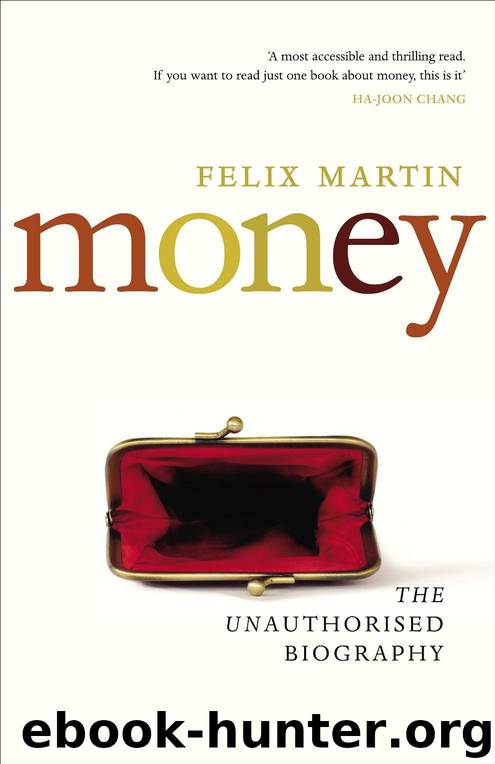Money: The Unauthorised Biography by Martin Felix

Author:Martin, Felix [Martin, Felix]
Language: eng
Format: mobi
Publisher: Random House
Published: 2013-06-06T04:00:00+00:00
John Law, before his fall (left, front view) – and after it (right, rear view).
By merging the single state holding company with the single state bank, Law made explicit what he believed to be obscured in a decentralised system of money and finance. All income and wealth flows in the end from the productive economy – and it is claims on this income alone that money ultimately represents. That income is, however, uncertain, because the world is an uncertain place – so the value of those claims is in reality uncertain too. The simplest way to acknowledge this fact of life is to transform the fixed financial claims that are generally used as money – otherwise known as debt – into variable ones – otherwise known as equity. That required something that did not exist in Holland or England, and has not existed since: a corporation that owns all the assets of the state, including its rights to collect taxes, in which citizens can own shares. This equity-money, of course, would provide much less security than conventional money, since its value could go down, as the System’s investors found out in 1720. But by the same token, it would provide a lot more mobility. For those who could not stomach such thoroughgoing transparency, the System also furnished a less powerful option: the notes issued by the Royal Bank. These had a fixed value in terms of the standard monetary unit. But that standard itself was now flexible, determined by the King’s Council at the level they felt most appropriate from an economic and a fiscal perspective. The only difference, in other words, was that for the notes it was the sovereign, rather than the market, that would set the value of money.
Law’s System was ingenious, innovative, and centuries ahead of its time. It was even to prove prophetic two hundred and fifty years later, when the international gold exchange standard finally disintegrated in 1973 and fiat monetary standards became the worldwide norm. Yet it failed spectacularly. Where was the flaw? There were of course plenty of circumstantial problems that bedevilled Law’s ambitious scheme. He overestimated his own abilities, and underestimated the vested interests that his System would disenfranchise. The plan attempted far too much in far too short a time. And Law’s particular idea of offering the public government equity rather than government debt was indeed so far ahead of its time that its like has not been seen again since.17 But far outweighing these incidental challenges, the Scotsman’s solution suffered from a much more fundamental flaw. It was a bug for which another neglected monetary genius had discovered the fix more than two millennia earlier.
Download
This site does not store any files on its server. We only index and link to content provided by other sites. Please contact the content providers to delete copyright contents if any and email us, we'll remove relevant links or contents immediately.
International Integration of the Brazilian Economy by Elias C. Grivoyannis(106924)
The Radium Girls by Kate Moore(12000)
Turbulence by E. J. Noyes(8001)
Nudge - Improving Decisions about Health, Wealth, and Happiness by Thaler Sunstein(7676)
The Black Swan by Nassim Nicholas Taleb(7085)
Rich Dad Poor Dad by Robert T. Kiyosaki(6568)
Pioneering Portfolio Management by David F. Swensen(6266)
Man-made Catastrophes and Risk Information Concealment by Dmitry Chernov & Didier Sornette(5977)
Zero to One by Peter Thiel(5759)
Secrecy World by Jake Bernstein(4724)
Millionaire: The Philanderer, Gambler, and Duelist Who Invented Modern Finance by Janet Gleeson(4441)
The Age of Surveillance Capitalism by Shoshana Zuboff(4264)
Skin in the Game by Nassim Nicholas Taleb(4223)
The Money Culture by Michael Lewis(4166)
Bullshit Jobs by David Graeber(4161)
Skin in the Game: Hidden Asymmetries in Daily Life by Nassim Nicholas Taleb(3972)
The Dhandho Investor by Mohnish Pabrai(3739)
The Wisdom of Finance by Mihir Desai(3714)
Blockchain Basics by Daniel Drescher(3564)
